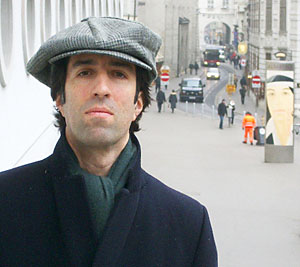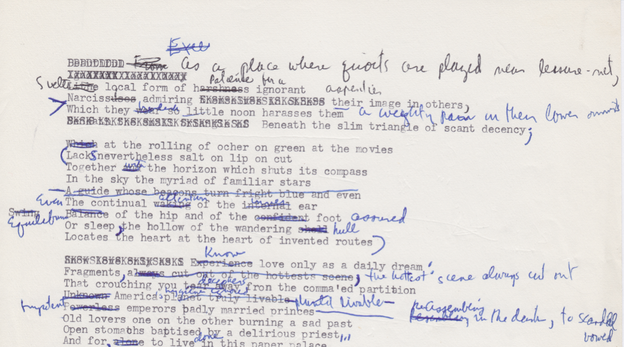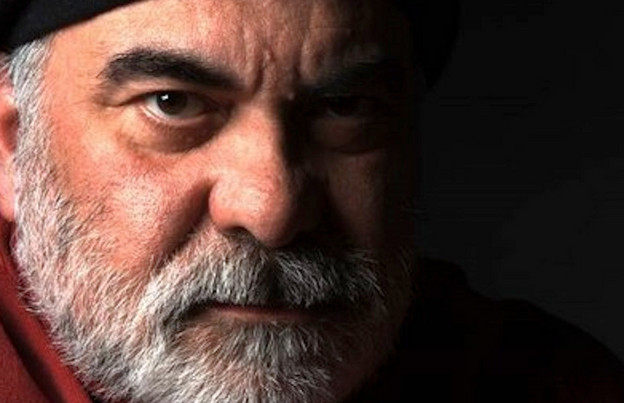|
|
Posted 6/4/2013 (link)
 We'd like to wish a very happy birthday to Vincent Katz, the poet, translator, art critic, Vanitas editor, and curator, who also happens to be the subject our PennSound's newest author page.
This new page brings together a handful of recordings that already existed on the site with some well-chosen selections from Katz's own archives, and starts all the way back in 1978 with his appearance on Public Access Poetry alongside Paul Schneeman. That's followed by the first of three readings at the St. Mark's Poetry Project in 1986 (the others are from 1992 and 2005), a 1987 Boston University reading from New York Hello! (Katz's collaboration with Rudy Burckhardt published in 1990), and a 2003 reading at Brown University. Later readings include a 2004 set at the Bruno Maria Gallery, a 2005 appearance at the Bowery Poetry Club and a 2011 reading with Anna Moschovakis at the Gloucester Writers Center. Finally, the page is rounded out video footage of a 2011 Paris symposium on "Collaboration & the Artist's Book," which also featured Bill Berkson, Shirley Jaffé, Raphael Rubinstein, Susan Bee and Charles Bernstein. Each of the aforementioned audio recordings has been segmented, which means that you have nearly 200 individual tracks for your listening pleasure. To start exploring this expansive archive, click the title above.
Posted 6/6/2013 (link)
 Today at Jacket2, Charles Bernstein shared some very exciting news about a newly-launched project using PennSound audio. Here's the complete announcement:
It is my great pleasure to announce Robin Seguy's genetic edition of John Ashbery's great poem "The Skaters." This is the first in the newly created Text/works series, a digital library that intends to make freely accessible critical editions and analytic tools for an array of 19th to 21st century French and American poetry collections.
We are very grateful to John and David Kermani for making the typescripts, as well as the text of the poem, available.
In its current state, this edition offers:
- a plain text version of the poem, with optional display of the lines and stanza numbers;
- the transcription of two typescript drafts of the poem, as well as 20 poems and fragments — 18 of which are unpublished — pertaining to the first typescript's dossier. The genetic dossier is displayed, with all variants, in four formats: HTML and XML-TEI, along high-resolution image files and searchable PDFs of the original pages;
- three annotated versions of the text: one showing "referential" data such as names, places, time markers, etc., the second the use of personal pronouns, and the third thematic data such as sounds, colors and weather notations throughout the text;
- a full searchable index, with links to the poem lines;
- a few elements of quantitative analysis, such as number of occurrences and frequencies for lexical items, etc.
Posted 6/24/2013 (link)
 Over at Jacket2, we've just published a small but very useful piece by Jenny Penberthy, editor of the landmark 2002 edition of Lorine Niedecker's Collected Works, detailing a handful of errors and omissions in that volume that have been corrected in the 2011 reprinting or will be fixed in a new reprinting later this year. Penberthy also starts by setting straight a few misconceptions contained in her 1992 inventory of Niedecker holdings within the Zukofsky collection at the Harry Ransom Humanities Research Center. "I'm aware that most devoted readers of Niedecker will have copies of the earlier printings," she writes. "Be warned! Either buy a paperback in 2014 or get out the marker pen!"
Of course, this serves as a wonderful opportunity for all of us to reconnect with Niedecker's writing, as well as with the all-too-brief set of recordings made by Cid Corman not long before Niedecker's death in 1970, which are housed on her PennSound author page. Longtime fans of the site will recall the somewhat serendipitous chain of events (including interventions by Marcella Durand and Eric Baus) that led to the creation of that page, but if you missed it, you can get the complete history here.
Posted 6/26/2013 (link)
 Yesterday we've launched the sixty-eighth episode in the PoemTalk Podcast series, whose focus is Ray DiPalma's 1976 poem, "It makes of nonsense." For this episode, host Al Filreis was joined by a geographically far-flung panel that included Aaron Shurin (in from the Bay Area), John Tranter (visiting from Australia), and Charles Bernstein (down from New York City).
Filreis' write-up of the episode on the PoemTalk blog begins with some provenence for the recording under discussion — which was taped by Bernstein at a November 10, 1977 event at the Ear Inn that also included sets by Michael Lally and Bruce Andrews (you can read more about the reading and the poets' friendship here) — as well as the poem itself, which DiPalma retyped specially for this PoemTalk episode. You can read the rest of his introduction on Jacket2.
PoemTalk is a co-production of PennSound, the Kelly Writers House, Jacket2 and the Poetry Foundation. If you're interested in more information on the series or want to hear our archives of previous episodes, please visit the PoemTalk blog, and don't forget that you can subscribe to the series through the iTunes music store.
Posted 6/28/2013 (link)
 Earlier this week, Charles Bernstein released the latest installment in his long-running Close Listening series, broadcast over Art International Radio. Bernstein's guest for this two part program, entitled "Performance of Freedom," is Tonya Foster, and here's his description of the show from his Jacket2 blog:
"Tonya Foster's new book, Swarms of Bees in High Court is forthcoming from Belladonna*. Foster lives in New York, where she is a doctoral student in English at the CUNY Graduate Center. On the first program, Foster reads from the book. In the second show Foster speaks of poetry as a 'performance of freedom,' discusses her odyssey from church choir in New Orleans to New York's innovative poetry communities. Along the way, Foster address the central role of sound and performance in her work, her multiple sense of identity, conflicting strains of work in current African-American poetry, the tensions between the articulation of lyric individuality and collective engagements, and the role of place in transnational or nonnational blackness."
You can listen to these programs on Foster's PennSound author page, which is also home to readings and talks from 2002 to the present, and for a decade's worth of innovative conversations with poets, artists, filmmakers and more, be sure to visit our Close Listening series page.
|
PennSound Daily archive
2025
2024
2023
2022
2021
2020
2019
2018
2017
2016
2015
2014
2013
2012
2011
2010
2009
2008
2007
|





